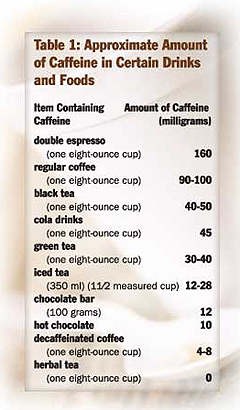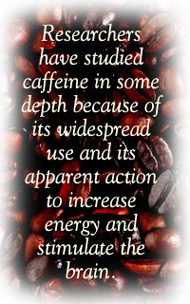BY ANDREW NELSON
 AFFEINE SEEMS TO BE everywhere in our modern world. Coffee, tea, sodas, energy drinks, hot chocolate, and medicines all contain caffeine (see Table 1). On the surface they seem harmless. Who doesn't eat chocolate every once in a while? Coffee establishments are flourishing as customers order cups of coffee, espresso, and other drinks. Drinking coffee often sets the scene for social gatherings. Many people driving late at night stop for that cup of coffee to keep them awake. Students who stay up all night studying may get that espresso to gain a few more hours of study.
AFFEINE SEEMS TO BE everywhere in our modern world. Coffee, tea, sodas, energy drinks, hot chocolate, and medicines all contain caffeine (see Table 1). On the surface they seem harmless. Who doesn't eat chocolate every once in a while? Coffee establishments are flourishing as customers order cups of coffee, espresso, and other drinks. Drinking coffee often sets the scene for social gatherings. Many people driving late at night stop for that cup of coffee to keep them awake. Students who stay up all night studying may get that espresso to gain a few more hours of study.
It's hard to argue that falling to sleep at the wheel, failing a test, or appearing unfriendly is the better alternative. However, does caffeine have a positive influence on our mind, or does it actually impair our mind? In addition, might caffeine just be adding "fuel to the fire"?
Current Research on Caffeine
Researchers have studied caffeine in some depth because of its widespread use and its apparent action to increase energy and stimulate the brain. Studies on caffeine's influence on the mind don't agree with one another.1 While some studies claim caffeine doesn't affect thought processes, other studies claim caffeine either improves or impairs certain aspects of our mind.
Two terms that need to be defined are "acute" caffeine use and "chronic" caffeine use. Acute caffeine use means that a person who normally ingests only minimal amounts of caffeine ingests a moderate to high dose of caffeine on certain occasions. Chronic caffeine use means that a person who normally ingests moderate to high amounts of caffeine continues in the moderate to high use.
One particular study that controlled confounding variables better than other studies in chronic and acute use of caffeine revealed interesting results.2 With acute use, caffeine increased attention and awareness at the expense of anxiety and a "post-use crash." Chronic caffeine use actually decreased attention and energy. With repeated caffeine ingestion, tolerance developed. This makes it easy for people to "need" caffeine to feel normal, and thus it becomes a habit. Caffeine withdrawal symptoms such as headache and sleepiness may occur, along with decreased mental performance.
 High levels of caffeine can be harmful to people. Caffeine toxicity produces signs of "caffeinism," meaning vomiting, abdominal pain, agitation, altered level of consciousness, muscle stiffness, seizures, and various cardiovascular effects. These problems may occur if a person who uses minimal amounts of caffeine on a regular basis takes between 15 and 20 cups of coffee in a few hours, although the amount varies among individuals.3
High levels of caffeine can be harmful to people. Caffeine toxicity produces signs of "caffeinism," meaning vomiting, abdominal pain, agitation, altered level of consciousness, muscle stiffness, seizures, and various cardiovascular effects. These problems may occur if a person who uses minimal amounts of caffeine on a regular basis takes between 15 and 20 cups of coffee in a few hours, although the amount varies among individuals.3
Caffeine is also being studied for medical application. Parkinson's disease, Alzheimer's disease, and magnetic resonance imaging are potential beneficiaries of caffeine research. In addition, many headache medicines contain caffeine as an agent that constricts blood vessels to decrease headaches. While caffeine is being considered in medicine, it is recommended that modified chemicals that do not have the properties of tolerance and other negative side effects that caffeine exhibits should be found and used instead of caffeine.
Ellen White's Comments
Ellen White discussed coffee and tea rather than caffeine. The word "coffee" appears 549 times, and "tea" 586 times; coffee and tea are used together 515 times.4 She does not talk about chocolate or cola.
Ellen White discussed the effect of caffeine on the mind, saying that it decreases brain activity, although it temporarily excites and increases energy with acute caffeine use. Furthermore, she realized the problem with chronic use. She said this about coffee and tea: "Tea has an influence to excite the nerves, and coffee benumbs the brain; both are highly injurious. You should be careful of your diet."5
On several occasions Ellen White drank green or black tea when she was sick. But other than these rare exceptions she did not drink coffee or caffeinated tea, or keep it in her house.6 She occasionally used catnip, red clover blossom, hop, and beef tea--all noncaffeinated drinks.
Although Ellen White did not have the benefit of the scientific knowledge now available, she concluded that coffee and tea impair the functioning of the mind and should be taken only rarely, for medicinal purposes on a short-term basis. She also discussed how harmful caffeine is on our mind and related it to our spiritual lives. Writing in the Review and Herald, she said of coffee and tea, "Those nerve irritants are wearing away the life forces, and the restlessness caused by shattered nerves, the impatience, the mental feebleness, becomes a warning element against spiritual progress."7 Truly, when the mind is clouded, our spiritual lives will also be impaired.
White's writings indicate that people should drink coffee and tea only for rare medicinal purposes. Medical knowledge has increased, and many more medicines are now available for treatment. In addition, coffee and tea are not necessary today because many medicines that do not cause anxiety, tolerance, post-use crash, or the potential for addiction are available.
Practical Suggestions
1. Be aware of foods and drinks that contain caffeine, and limit your intake.
2. Be careful not to embrace any medicine with large amounts of caffeine in it. Is there a safer medicine available?
3. If drinking coffee has become a habit so that you need it to wake up in the morning, try tapering off until it is no longer needed.
 As some people enjoy the smell and taste of coffee, decaffeinated coffee has become popular. For coffee to be labeled decaffeinated, more than 97 percent of the caffeine must be removed. Many decaffeinated coffees, however, are 99.7 percent free. Some tea labels give a good comparison of the amount of caffeine in various drinks and foods.
As some people enjoy the smell and taste of coffee, decaffeinated coffee has become popular. For coffee to be labeled decaffeinated, more than 97 percent of the caffeine must be removed. Many decaffeinated coffees, however, are 99.7 percent free. Some tea labels give a good comparison of the amount of caffeine in various drinks and foods.
4. Plan ahead. For driving trips, allow extra time to get to your destination so you can stop for a while if you need to rest. For study strategies, instead of allowing desperate situations to arise that necessitate prolonged wakefulness, prepare for your test all term. (I know--who doesn't plan to do that!) If this is done, however, instead of needing to stay awake the night prior to the test, you can get a good night's sleep and not only pass the test, but get one of the highest grades!
5. If you're meeting with a group of friends at Starbucks and don't want to appear rude, get a low-caffeinated drink--or even politely say that you don't drink coffee.
Conclusion
Because the mind and conscience are intimately related, Ellen White was concerned about how caffeine may affect us spiritually. The apostle Paul gives us this vision: "Therefore, I urge you, brothers, in view of God's mercy, to offer your bodies as living sacrifices, holy and pleasing to God--this is your spiritual act of worship. Do not conform any longer to the pattern of this world, but be transformed by the renewing of your mind. Then you will be able to test and approve what God's will is--his good, pleasing and perfect will."8
What a wonderful vision Paul gives us about what we can be as we understand God's will for our lives! When we consider how we may better serve God and others through changes in all areas of our lifestyle--be it through less caffeine, better nutrition, exercise, or devotions, to name a few--following God's plan is a real joy.
_________________________
1 Eddy M. Elmer, "The use of stimulant
substances by college students to enhance academic performance--a subtle form of cheating?" (Department of Psychology, Simon Fraser University, November 2002).
2 Jack E. James, "Acute and chronic effects of caffeine on performance mood, headache, and sleep," Neuropsychobiology 38 (1998): 32-41.
3 Goldfrank's toxicologic emergencies, sixth ed. (Stamford, Conn.: Appleton and Lange, 1998), pp. 555-562.
4 CD Library: The Complete Published Ellen G. White Writings (Ellen G. White Estate, Inc., 1998).
5 Ellen G. White, Testimonies for the Church (Mountain View, Calif.: Pacific Press Pub. Assn., 1948), vol. 4, p. 365.
6 White, Selected Messages (Washington, D.C.: Review and Herald Pub. Assn., 1958), book 2, pp. 301, 302.
7 Apr. 19, 1887.
8 Rom. 12:1, 2, NIV.
_________________________
Andrew Nelson is a medical student at Loma Linda University, expecting to receive his M.D. degree in May. This article was authored under the supervision of Robert J. Cruise, Ph.D., director and professor of research at La Sierra University and member of the Loma Linda University research staff, and Elissa Kido, Ed.D., dean of the School of Education at La Sierra University.


